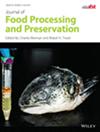Encapsulation of Hydrophobic Bioactive Substances for Food Applications: Carriers, Techniques, and Biosafety
IF 2
3区 农林科学
Q3 FOOD SCIENCE & TECHNOLOGY
引用次数: 0
Abstract
Biologically active substances (BASs) are used as novel ingredients to design functional foods. These functional foods are alternate approaches to treat or cure chronic diseases. However, the application of BASs is limited due to their hydrophobic nature, low bioavailability, sensitivity to gastric acid, and environmental conditions (i.e., high temperatures, radiation, pH, and oxygen). Thus, research has been channeled to find ways of curbing these limitations. This review provides an overview of the modern methods for BAS encapsulation, carrier classifications, benefits, and drawbacks as well as the biosafety of encapsulated BASs. Encapsulation of BASs into organic/inorganic carriers or composites overcomes the limitations mentioned above. In addition, encapsulation enables the controlled release of active compounds to target cells. The market for encapsulated foods has grown globally at a significant pace due to their various applications as functional foods, dietary supplements, and other products. It is estimated that by 2027, the market worth of encapsulated foods will be valued at $17 billion.食品应用中疏水生物活性物质的封装:载体、技术和生物安全
生物活性物质(BAS)被用作设计功能食品的新型配料。这些功能食品是治疗或治愈慢性疾病的替代方法。然而,由于生物活性物质具有疏水性、生物利用率低、对胃酸和环境条件(如高温、辐射、pH 值和氧气)敏感等特点,其应用受到了限制。因此,研究人员一直在寻找克服这些限制的方法。本综述概述了 BAS 的现代封装方法、载体分类、优点和缺点以及封装 BAS 的生物安全性。将 BAS 封装到有机/无机载体或复合材料中可以克服上述限制。此外,封装还能控制活性化合物向目标细胞的释放。由于封装食品在功能食品、膳食补充剂和其他产品中的各种应用,全球封装食品市场增长迅速。据估计,到 2027 年,封装食品的市场价值将达到 170 亿美元。
本文章由计算机程序翻译,如有差异,请以英文原文为准。
求助全文
约1分钟内获得全文
求助全文
来源期刊
CiteScore
5.30
自引率
12.00%
发文量
1000
审稿时长
2.3 months
期刊介绍:
The journal presents readers with the latest research, knowledge, emerging technologies, and advances in food processing and preservation. Encompassing chemical, physical, quality, and engineering properties of food materials, the Journal of Food Processing and Preservation provides a balance between fundamental chemistry and engineering principles and applicable food processing and preservation technologies.
This is the only journal dedicated to publishing both fundamental and applied research relating to food processing and preservation, benefiting the research, commercial, and industrial communities. It publishes research articles directed at the safe preservation and successful consumer acceptance of unique, innovative, non-traditional international or domestic foods. In addition, the journal features important discussions of current economic and regulatory policies and their effects on the safe and quality processing and preservation of a wide array of foods.

 求助内容:
求助内容: 应助结果提醒方式:
应助结果提醒方式:


